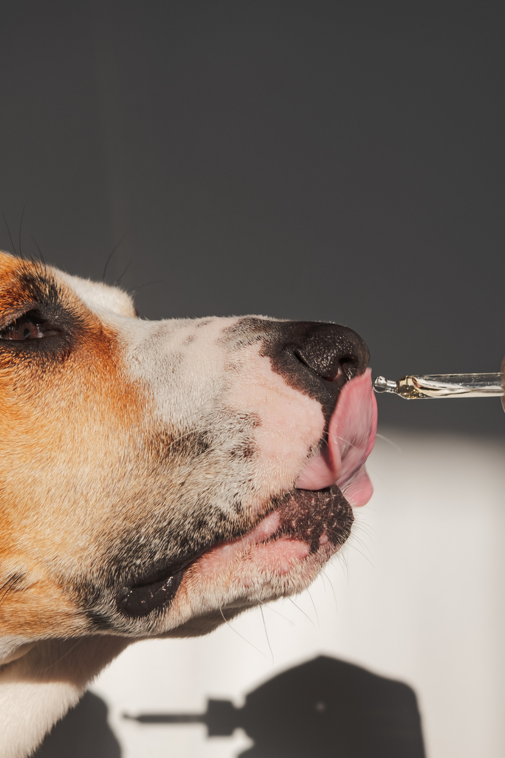Coconut oil for dogs has garnered significant attention in recent years, and for good reason. As a dog owner myself, I’ve always been on the lookout for natural remedies to boost my furry friend’s health and vitality.
Coconut oil, derived from the meat of mature coconuts, isn’t just a staple in many human diets; it’s also a versatile asset in canine care.
Packed with beneficial fatty acids, this tropical treasure has been lauded for its myriad of health advantages. From enhancing their glossy coats and soothing skin conditions to supporting digestive health, the potential seems vast.
My journey into understanding the wonders of this natural elixir was nothing short of eye-opening, and it’s a pleasure to share this discovery with fellow dog lovers.
As we delve deeper, let’s uncover the science and anecdotes behind this tropical treat’s rise to canine fame.
Is Coconut Oil Good for Dogs?
Coconut oil is beneficial for dogs due to its rich content of medium-chain triglycerides (MCTs), primarily lauric acid. These MCTs possess anti-inflammatory, antibacterial, and antifungal properties.
When ingested, coconut oil can enhance skin health, resulting in a shinier coat, support digestion, and boost the immune system. Additionally, its antimicrobial qualities can fend off pathogens, supporting overall well-being.
Topically applied, it soothes skin conditions, rashes, and wounds. Furthermore, studies suggest that MCTs in coconut oil provide an energy source for the brain, potentially enhancing cognitive functions.
Thus, both internally and externally, coconut oil offers multifaceted benefits for dogs.
Benefits of Coconut Oil to Furry Friend

Skin Health and Coat Shine
Coconut oil acts as a natural moisturizer, and when applied topically, it can alleviate dry skin, itchiness, and eczema in dogs. Its anti-inflammatory properties help reduce allergic reactions and improve overall skin health. Moreover, when ingested, the oil promotes a glossy, shiny coat. Its rich content of medium-chain triglycerides (MCTs) nourishes the dog’s skin from the inside out, making its fur soft and gleaming.
Digestive Support
Coconut oil contains beneficial fats that can improve digestion and nutrient absorption in dogs. It has been reported to help with colitis and inflammatory bowel syndrome. The MCTs in the oil are efficiently metabolized by the liver, providing an immediate source of energy for dogs and promoting optimal digestive health. Additionally, it can help in the elimination of hairballs by acting as a natural lubricant.
Immune System Boost
Lauric acid, a key component in coconut oil, has antimicrobial properties that can help fend off bacteria, fungi, and viruses. This means that regular consumption can bolster a dog’s immune system, making them more resilient against infections. The antiviral and antibacterial nature of coconut oil supports the dog’s overall well-being, helping to stave off illness and ensure they remain active and happy.
Brain and Cognitive Function
Research has indicated that the MCTs in coconut oil can serve as a fuel source for the brain. In older dogs, regular consumption of coconut oil might help in mitigating cognitive decline. The ketones produced from the breakdown of MCTs are an alternative energy source for the brain, potentially supporting sharper cognitive functions and memory in canines.
Anti-inflammatory and Joint Health
For dogs suffering from arthritis or joint issues, coconut oil can offer some relief. Its natural anti-inflammatory properties can reduce pain and improve mobility. While it’s not a cure, when combined with a balanced diet and regular exercise, coconut oil can be a beneficial supplement to support joint health in dogs.
Click here to buy coconut oil for dogs now.
How to Use Coconut Oils for Dogs?
1. Choose the Right Type
Always opt for virgin or extra-virgin coconut oil, ensuring it’s unrefined and free from additives. These options retain the maximum benefits for your dog.
2. Start Slowly
When introducing coconut oil into your dog’s diet, begin with a small amount. For small dogs, a quarter teaspoon is sufficient, and for larger dogs, one teaspoon. Gradually increase this dose as your dog’s system adapts.
3. Apply Topically
For skin conditions, rashes, or cuts, gently rub a small amount of coconut oil onto the affected area. Its antimicrobial properties can help in healing.
4. Dental Care
Coconut oil can be an effective toothpaste alternative. Simply apply a dab to your dog’s teeth and brush gently. It helps in reducing bad breath and promotes gum health.
5. Baking and Cooking
Enhance your dog’s treats by adding coconut oil to the baking or cooking process. It’s a flavorful addition that dogs generally love.
Related: The Benefits of Salmon Oil for Dogs
How To Choose Coconut Oil for Dogs?

Selecting the right coconut oil for your dog requires careful consideration.
- Always opt for “virgin” or “extra-virgin” labels, which signify that the oil is unrefined, retaining all its natural benefits.
- Look for “cold-pressed” coconut oil, as this method of extraction preserves the oil’s nutritional values better than other methods.
- Choose a product that’s organic and free from pesticides or chemicals. This ensures you’re giving your pet a pure, untainted product.
- Transparency is key; the best brands will clearly list their sourcing and processing methods.
- Research and read reviews to understand other pet owner’s experiences with the brand before making a choice.
Potential Risks of Giving Your Dog Coconut Oil
While coconut oil offers several benefits for dogs, there are potential risks to be aware of:
Weight Gain: Coconut oil is high in calories. If given in large amounts or too frequently without adjusting the overall calorie intake, it can lead to weight gain in dogs.
Digestive Upset: Introducing coconut oil too quickly or in excessive amounts can cause diarrhea or greasy stools in some dogs. It’s essential to start with a small amount and observe your dog’s reaction.
Allergies: Though rare, some dogs might be allergic to coconut oil. Signs of an allergic reaction can include itching, redness, hives, or more severe symptoms. It’s crucial to monitor your dog for any adverse reactions when first introducing any new supplement.
Cholesterol Concerns: While many believe that the saturated fats in coconut oil are beneficial, others argue they might raise LDL (bad cholesterol) levels. The implications of this in dogs are still being researched.
Potential for Pancreatitis: Dogs with a history of pancreatitis should be given coconut oil with caution. The high fat content can be a trigger for some dogs, leading to a flare-up of the condition.
Interaction with Medications: Coconut oil may interact with certain medications. If your dog is on medication, consult with your veterinarian before introducing coconut oil to their diet.
Click here to buy coconut oil for dogs’ skin and coat now.
How Much Coconut Oil Should I Give My Dog?
The amount of coconut oil you should give your dog largely depends on its weight and overall health. Here’s a general guideline:
Starting Dosage
As with any new supplement, it’s essential to start slowly to gauge your dog’s reaction. Begin with a quarter of the recommended dosage and gradually increase it over a week.
General Guideline
Small dogs (up to 10 lbs): Start with 1/4 teaspoon per day and gradually increase to 1 teaspoon.
Medium dogs (10-30 lbs): Begin with 1/2 teaspoon and work up to 1-2 teaspoons daily.
Large dogs (30-70 lbs): Start at 1 teaspoon and increase to 2 tablespoons daily.
Extra-large dogs (over 70 lbs): Begin with 1.5 teaspoons and work up to 2.5 tablespoons daily.
Topical Application
If you’re using coconut oil externally for skin or coat issues, the amount will vary based on the size of the affected area. It’s essential to use just enough to cover the region thinly.
For Specific Health Concerns
If you’re considering coconut oil for a specific health issue, it’s crucial to consult with your veterinarian. They can provide guidance tailored to your dog’s unique situation.
Monitor Caloric Intake
Remember that coconut oil is high in calories. If you’re adding it to your dog’s diet, you may need to reduce other caloric sources slightly to prevent weight gain.
FAQs
Is coconut oil safe for all dogs?
While many dogs benefit from coconut oil, some might be allergic or sensitive to it. Always introduce it slowly and monitor your dog for any adverse reactions.
How often can I give my dog coconut oil?
For dietary purposes, it’s typically given once daily. However, the frequency might vary based on the dog’s size and health needs. Always start with a small amount and consult a veterinarian.
Can I apply coconut oil directly to my dog’s wounds or rashes?
Yes, coconut oil’s anti-inflammatory and antimicrobial properties can help soothe and heal minor wounds or rashes. However, for severe issues, consult a vet.
Does coconut oil help with bad breath in dogs?
Yes, coconut oil has antimicrobial properties that can help reduce bacteria causing bad breath. It’s sometimes used as a natural toothpaste alternative for dogs.
Can coconut oil cause diarrhea in dogs?
If introduced too quickly or given in excessive amounts, coconut oil can lead to digestive upset, including diarrhea. It’s best to start with small doses and increase gradually.
Can I use coconut oil on my puppy?
While coconut oil is generally safe, puppies have more sensitive systems. Introduce it very slowly and in minimal amounts, always monitoring for any reactions.
Are there specific brands of coconut oil recommended for dogs?
It’s best to choose organic, virgin, extra-virgin, and cold-pressed coconut oil, as these retain the most health benefits. Brands might vary by region, so reading reviews and consulting with a vet or fellow dog owners can be helpful.
Click here to buy coconut oil for dogs’ itchy skin now.
Summary
Coconut oil offers numerous benefits for dogs due to its rich medium-chain triglycerides content, particularly lauric acid. Internally, it promotes skin health, aids digestion, boosts the immune system, and may enhance cognitive function. Externally, it can be applied to soothe skin conditions and minor wounds. However, it’s crucial to introduce it slowly, as some dogs might be allergic or sensitive, and excessive amounts can cause digestive upsets. For best results, select organic, virgin, extra-virgin, and cold-pressed varieties. While many dogs benefit from coconut oil, always consult a veterinarian before introducing any new supplement to ensure it’s appropriate for your specific pet.
Learn if castor oil, peanut oil, or jojoba oil are safe for dogs. You can also learn the benefits of fish oil for dogs here.



Comments are closed.